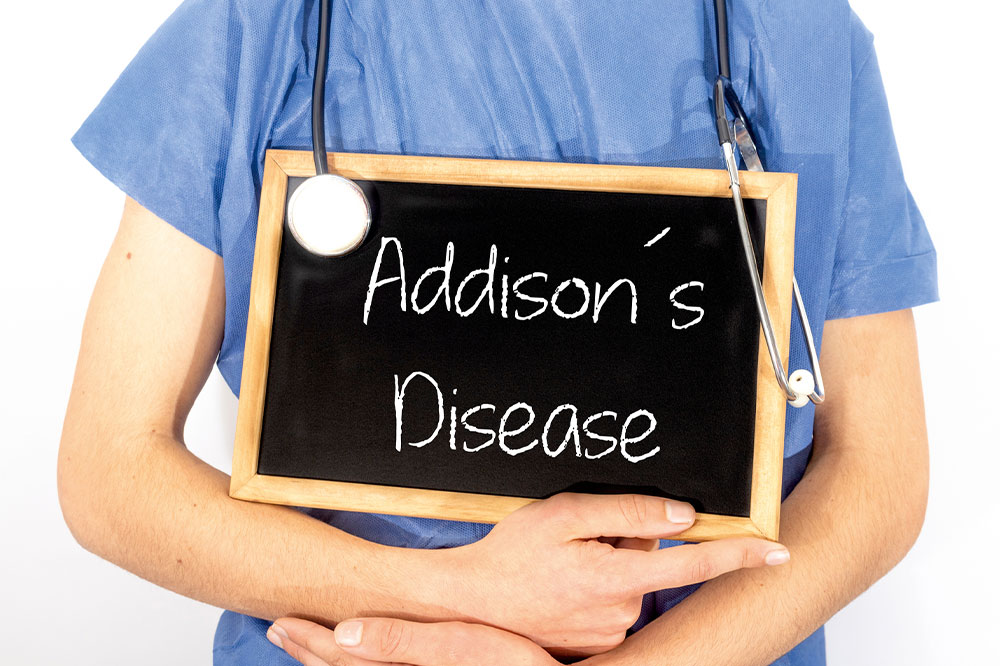
Addison’s disease – Symptoms, causes, and management
Also called adrenal insufficiency, Addison’s disease is a rare illness that develops when the body does not yield certain hormones in adequate quantities. The adrenal glands make too little cortisol and aldosterone in those with Addison’s disease. It is life-threatening and can affect anyone. Prevalent treatment measures involve taking hormones to replace the ones missing. This article attempts to shed light on the symptoms, causes, and management of Addison’s disease.
Symptoms
In people with Addison’s disease, adrenal gland damage is gradual and happens over time. Thus, the symptoms also develop slowly and may vary from one person to another. Some common symptoms include the following:
- Fatigue that aggravates steadily
- Hyperpigmentation or dark skin patches, usually on the gums and around skin creases and scars
- Nausea
- Diarrhea
- Abdominal pain
- Vomiting
- Incomprehensible weight loss
- Loss of appetite
- Dehydration
- Muscle spasms and pain
- Low blood pressure resulting in dizziness or lightheadedness upon standing
- Joint pain
- Craving for salty food
- Change in behavior and mood, such as poor concentration, depression, and irritability
- Low blood sugar
People assigned females at birth with Addison’s disease might also experience reduced sexual drive, loss of body hair, and abnormal menstruation. In some cases, symptoms can come rapidly after a severe illness, injury, or extreme stress, resulting in a life-threatening event known as acute adrenal failure or Addisonian crisis. It is a medical emergency. It can result in death and shock if not treated. Some prevalent symptoms linked to the Addisonian crisis are as follows:
- Loss of consciousness
- Low blood pressure
- Severe diarrhea and vomiting, resulting in dehydration
- Feeling confused, restless, or afraid
- Severe and sudden pain in the legs, belly, or lower back
- Mental changes
- Extreme weakness
Those experiencing such symptoms must visit the nearest hospital at the earliest.
Causes
Broadly, Addison’s disease can be classified into two categories: secondary and primary. For a doctor to suggest an apt treatment method, they must know the type responsible for a patient’s condition.
- Secondary adrenal insufficiency
It occurs when the pituitary gland located in the brain fails to yield adrenocorticotropic hormone. This hormone triggers the adrenal glands when they must release hormones. Further, people who do not take certain immunosuppressant treatment methods as suggested by their doctor may also develop adrenal insufficiency. Other causes for this type of Addison’s disease are traumatic brain injury, genetics, and tumors. - Primary adrenal insufficiency
It occurs when the adrenal glands are damaged so severely that they fail to produce hormones. It happens when the immune system attacks the adrenal glands. It is an autoimmune disease. Other causes for this type of Addison disease are body infections, some blood thinners that help control blood clotting, abnormal growth, and cancer.
Treatment
A doctor may recommend prescription treatment methods for treating Addison’s disease. One will also have to take hormone replacement therapy to rectify the hormone levels that the body is not making adequately. Further, one will require plenty of salt in your meals, especially during heavy workouts, digestive upsets, or hot days.
Other treatment options are:
- Carrying a medical alert bracelet and card at all times so emergency care providers know what care one requires,
- Keeping an injection kit handy,
- Staying in touch with one’s healthcare provider, and
- Undergoing yearly examinations.




